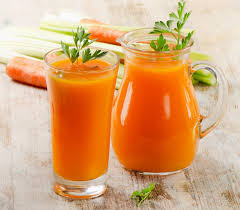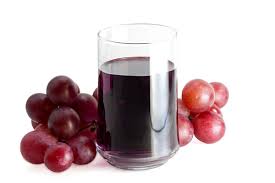It is common for parents to wonder when their baby can have fruit or vegetable juices. Giving baby juice too soon or in large quantities may cause digestive and skin issues. It can also add calories that make them eat less at mealtime. The truth is, juice is not necessary for babies. Juices should not be given to an infant under 6 months old and need to be limited to less than 4 ounces daily in babies over 6 months old. Side-effects of too much juice include skin rashes, smaller appetite, and even diarrhea. Below are some general guidelines to help you understand about giving baby juice.
Guidelines For Giving Baby Juice
- Time and amout: Small amounts of juice for babies 6 months or older is fine if limited to 4 ounces a day. For maximum amount, babies aging 12 months or older should limit to 6 ounces of juice per day. It is even better if you add water to reduce the sugar content.
Follow the tips below for giving baby juice:
- Do not put juice in a bottle. The sugar in the juice can sit on your child’s teeth and cause them to decay. Only give juice out of a “sippy cup” or a regular cup, this is because babies tend to sip bottles slowly. Bottles should only contain water.
- Only give juice at the end of a meal. Have baby eat most of his or her food and then offer juice toward the end of the meal. This will help increase healthy calories from foods. Giving baby juice too early or before meals will reduce appetite.
- Use only 100% fruit juices. Check labels for 100% juice with no added sugars or fructose corn syrups. Many juices contain additives and extra sugar that will increase calories that are unhealthy and lower your baby’s appetite. Watch out for juice drinks that say juice cocktail, fruit punch, fruit juice beverage, or juice drink. Many drinks that contain less than 100% juice are no healthier than drinking a carbonated soda.
- Offer whole fruit. Eating a piece of whole fruit is better for your baby than giving baby juice. Depending on baby’s age offer things like mashed banana, applesauce, or cut up peaches.
- Increase water intake during hot weather. If your baby is thirsty, give extra water to drink. Water does not contain extra calories and if fluoridated will help protect the teeth. You can also use water to dilute fruit juice for baby.
Issues with Giving Baby Juice
- Juice can fill baby up with unnecessary calories and they miss out on important vitamins, minerals, and proteins. If your baby is not gaining weight properly, one solution is to take a look at how much juice he is taking in.
- Juice can cause early tooth decay. If you have ever heard the term “baby bottle mouth” this is caused by putting sugary substances in the bottle during the day or to sleep with. This damages the delicate enamel on baby’s teeth. Some babies need extensive repair and the condition can even be quite painful. Always give juice watered down and out of a cup.
- Giving baby juice in large amounts throughout the day can result in digestive problems like diarrhea.Too much juice can cause loose bowel movements. While this may be helpful if your baby is constipated. Try giving 4 oz. apple juice full strength once daily until constipation resolves. Once your baby is going normally again, begin using water in the juice again to avoid diarrhea.
- Be wary of juices that have high fructose corn syrup in them. These have been known to cause stomach upset, gas, and stomach pain in babies. This is due to immature digestive systems being unable to break down these types of sugar.
- Never give babies juice that has not been pasteurized. These include raw juices, organic juices, and fresh squeezed juice not made at home. Unpasteurized juices (juices that have not been heated) may have the very dangerous bacteria; Salmonella or E-Coli. Infections with these could be fatal in young babies.
Juice Recipes for Baby
You can make delicious homemade juices for your baby as long as they are over 6 months old and you use very clean, fresh fruits. Use caution because unpasteurized (heated) juices can cause bacterial infections in the digestive system that can be very serious. Never give apple cider that has not been pasteurized to an infant or even a toddler over one year of age.
If your baby is over 6 months old, you can try these juice recipes at home:
1. Carrot Juice
 Carrot juice is high in vitamin A, magnesium, calcium, iron, and sodium. You can place cooked chopped carrots into the blender and puree. Add 10 parts boiled water and strain. Give this to baby immediately and throw out any unused juice. For more flavor, add ½ boiled apple or beetroot.
Carrot juice is high in vitamin A, magnesium, calcium, iron, and sodium. You can place cooked chopped carrots into the blender and puree. Add 10 parts boiled water and strain. Give this to baby immediately and throw out any unused juice. For more flavor, add ½ boiled apple or beetroot.
2. Grape Juice
 Grapes are high in vitamins, antioxidants, and flavonoids. Place 1 cup of grapes into the blender with 10 parts boiled and cooled water. Puree and strain. Grape juice is high in sugar and should already be very sweet.
Grapes are high in vitamins, antioxidants, and flavonoids. Place 1 cup of grapes into the blender with 10 parts boiled and cooled water. Puree and strain. Grape juice is high in sugar and should already be very sweet.
3. Fresh Apple Punch
 Apples are high in Vitamin A, Folate, Magnesium, and Calcium. Take 1 cup of chopped apple and 1 cup of water and boil in pan. Push through a strainer and cool. You can add in fresh cooked, strained carrots to make the punch. Feed it to baby right away and throw away any unused juice.
Apples are high in Vitamin A, Folate, Magnesium, and Calcium. Take 1 cup of chopped apple and 1 cup of water and boil in pan. Push through a strainer and cool. You can add in fresh cooked, strained carrots to make the punch. Feed it to baby right away and throw away any unused juice.
4. Watermelon Juice
 Watermelon is high in calcium, vitamin A, and vitamin C. Take ½ cup unseeded watermelon and place into the blender. Add 10 parts boiled and cooled water and strain. Only give small amounts to babies over one year old as it can be hard on immature digestive systems and cause diarrhea.
Watermelon is high in calcium, vitamin A, and vitamin C. Take ½ cup unseeded watermelon and place into the blender. Add 10 parts boiled and cooled water and strain. Only give small amounts to babies over one year old as it can be hard on immature digestive systems and cause diarrhea.
